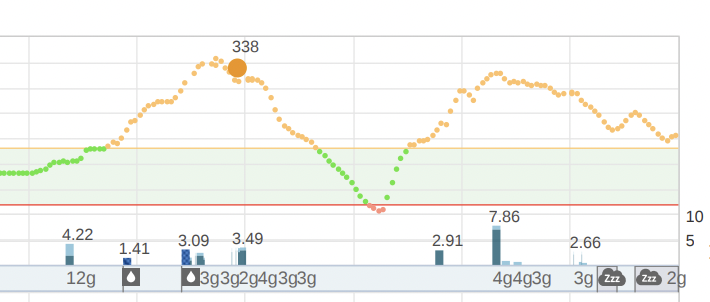In the ever-evolving world of weight loss and diabetes management, dietary choices play a pivotal role. Often, we are directed towards adopting a low-carb lifestyle, where high-fat, highly-processed dairy products seem to be a preferred choice due to their minimal carbohydrate content. However, recent research highlights a paradox: while these dairy products are typically low in carbs, they can potentially increase insulin resistance, resulting in elevated insulin levels that complicate blood sugar management and weight loss efforts.
Low-Carb Diets and the Appeal of High-Fat Dairy
Low-carb diets have gained popularity for their potential to assist in weight loss and better blood sugar control for those with diabetes, PCOS, and metabolic concerns revolving around insulin. These diets often emphasize foods low in carbohydrates while allowing for the inclusion of high-fat, highly-processed dairy products. However, the relationship between high-fat dairy and insulin resistance is not as straightforward as it may seem.
High-Fat, Highly-Processed Dairy and Insulin Resistance
Research suggests that saturated fats found in high-fat dairy products can contribute to insulin resistance. This occurs as these fats promote inflammation and interfere with insulin signaling pathways, making it more challenging for cells to efficiently take up glucose from the bloodstream.
To compensate for reduced insulin sensitivity, the body may release higher levels of insulin when high-fat dairy is consumed. This elevated insulin can lead to weight gain and hinder the breakdown of stored fat, thereby affecting weight loss goals.
For those with insulin-dependent diabetes, this increase need for insulin due to the resistance can cause stubborn hyperglycemia. Which can be difficult to treat and often causes stacking in insulin and hypoglycemia. Which then causes the obnoxious and mentally and physically draining gluco-coaster with your blood sugar.
Below is a picture of one of my client’s Tslim X2 Tandem Pump Reports (before working with me) because she did not know how food, even low carb foods such as cheese, can cause unruly blood sugar.

Mitigating Insulin Resistance: While lower carb vegetables contain more carbohydrates than high-fat dairy, their overall impact on insulin resistance can be less detrimental. The nutrient content, fiber, and low glycemic index of these vegetables help stabilize blood sugar levels and improve insulin sensitivity.
Nutrient Density: Lower carb vegetables offer a wealth of essential vitamins, minerals, and phytonutrients that support overall health and metabolism. In comparison, certain high-fat dairy products may lack these valuable nutrients.
Balanced Approach: Striking a balance between low-carb and nutrient-dense vegetables and carefully chosen high-fat dairy products can be a more sustainable approach. This allows individuals to enjoy the benefits of lower carb eating while avoiding the potential pitfalls of excessive saturated fat intake from highly-processed foods.
Navigating Saturated Fats: Dairy vs. Meat in the Low-Carb World
Saturated fat is a popular topic in the low-carb world. While we just covered the reasons why saturated fat from dairy can actually deter your weight loss efforts and make diabetes management difficult, it is vital to understand that the source of saturated fat determines the effect it has on the body.
Saturated Fat from Highly Processed Dairy Sources
Highly processed dairy products like certain ice creams, pastries, and cream-based sauces often contain saturated fats that have undergone additional and heavy processing. Here’s how these highly-processed saturated fats may affect insulin resistance:
- Added Sugars: Processed dairy items frequently include added sugars to enhance flavor. Elevated sugar consumption can contribute to insulin resistance and hinder healthy blood sugar control.
- Overall Composition: These processed dairy products may possess an imbalanced nutritional profile, with a higher proportion of unhealthy fats and sugars compared to whole, unprocessed dairy. This composition can exacerbate insulin resistance when consumed excessively.
- Trans Fats: Some processed dairy products may contain trans fats, which are artificially modified unsaturated fats. The natural trans fats in meats, such as conjugated linoleic acid (CLA), have actually been studied for their potential health benefits, including anti-inflammatory properties and potential improvements in insulin sensitivity. However, the artificial trans fats in processed dairy products should still be reduced or avoided if you are trying to improve overall insulin sensitivity and better blood sugar management.

Saturated Fat from Animal Meats
Saturated fats found in animal meats like beef, pork, bison, and lamb are in their natural form. Here’s how these fats may influence insulin resistance:
- Natural Form: Unlike trans fats, saturated fats in animal meats occur naturally and are not artificially modified.
- Protein Content: Animal meats are rich sources of protein, which can positively affect insulin sensitivity. Protein-rich diets have been shown to improve blood sugar control and promote satiety.
- Additional Nutrients: Animal meats provide essential nutrients such as vitamins and minerals, which can support overall health and metabolism.
The Importance of Meat Quality: Grass-Fed vs. Processed Meats
As you consider adding more meat to your diet, the quality and type of meat you choose can significantly impact your overall health and weight management. Here are some essential factors to consider:

Grass-Fed Meat vs. Highly Processed Meats:
- Grass-Fed Meat: Opting for grass-fed or pasture-raised meat can make a significant difference in the nutritional profile of the meat. These animals are typically raised on a natural diet of grass, which results in meat that is leaner and richer in beneficial nutrients such as omega-3 fatty acids, antioxidants, and vitamins.
- Highly Processed Meats: Highly processed meats, on the other hand, often undergo extensive processing that includes additives, preservatives, such as carcinogenic nitrites and nitrates. Consuming these processed meats has been linked to a higher risk of various health issues, including heart disease and certain types of cancer. Minimizing the intake of processed meats is a wise dietary choice.
Avoiding High Heat Cooking:
- High Heat Cooking: When cooking meat at very high temperatures, such as grilling or frying at extremely high heat, can lead to the formation of compounds known as heterocyclic amines (HCAs) and polycyclic aromatic hydrocarbons (PAHs). These compounds have been associated with an increased risk of cancer. Using cooking methods like baking, broiling, or slow cooking at lower temperatures can help mitigate the formation of these harmful compounds.
Benefits of Incorporating Nutrient-Dense Meat into Your Diet:
Adding nutrient-dense meats to your diet offers several advantages, especially when it comes to weight and diabetes management, and body composition:
- Satiety and Reduced Appetite: Nutrient-dense meats, such as grass-fed beef, are rich in protein. Protein is highly satiating and can help reduce appetite, leading to fewer overall calories consumed. This can be beneficial for weight loss and weight management, as it supports a reduced calorie intake.
- Promoting Muscle Growth: Protein is essential for muscle growth and repair. Incorporating high-quality meat into your diet provides the necessary amino acids and nutrients to support muscle development. As individuals gain muscle mass, they tend to have a higher metabolic rate, which can aid in weight loss and promote a more toned and fit physique.
- Improved Body Composition: The combination of reduced appetite, increased protein intake, and muscle growth can contribute to improved body composition. This means a higher ratio of lean muscle to body fat, resulting in better overall toning and a healthier appearance.
- High Bio-Absorption with Quality Meat: Our bodies have a remarkable ability to absorb and utilize nutrients from meat efficiently, thanks to their high bioavailability.
Note on Minimally-Processed Whole Milk: It’s important to distinguish between highly processed dairy products and minimally-processed whole milk when considering dairy choices. Minimally-processed whole milk, directly sourced from cows, falls more closely into the category of high-quality meat than highly processed dairy products. Some research suggests that whole milk may not have the same detrimental effects on health as highly processed dairy products with added sugars and artificial trans fats. However, more research is needed to fully understand the impact of whole milk on health, particularly in the context of insulin resistance, satiety, weight loss, and diabetes management.
Insulin Resistance and Its Role in Weight Management
Insulin resistance is a central player in the complex relationship between dietary fats and weight management:
Insulin Resistance and Weight Gain: When insulin resistance sets in, the body compensates by producing more insulin, which can lead to fat storage and inhibit the breakdown of stored fat. This makes it easier to gain weight and harder to shed excess pounds.
Processed Dairy and Weight: Highly processed dairy products, with their processed trans fats and added sugars, not only contribute to insulin resistance but also promote overeating and cravings for high-calorie, sugary foods. This can significantly impede weight loss efforts.
Animal Meats and Weight: Saturated fats from grass-fed animal meats are not in the same category as highly processed, high-fat dairy. The protein content and overall nutrient profile of these meats can promote satiety, improve blood sugar management, and support healthier eating patterns.
Conclusion
In the quest for weight loss and effective diabetes management, the relationship between dietary choices, insulin resistance, and carbohydrate intake is complex. While low-carb diets are often recommended, it’s crucial to be mindful of the potential impact of highly processed dairy products, which may exacerbate insulin resistance and hinder weight loss.
To make informed dietary decisions, prioritize a balanced diet that includes a variety of nutrient-rich foods while limiting highly processed, sugary, and trans fat-containing products. Consultation with healthcare providers or registered dietitians is essential for personalized guidance on managing insulin resistance and diabetes through dietary modifications. Remember, your diet plays a significant role in your overall health, so choose wisely and maintain a healthy, balanced lifestyle.
Registered Dietitian Nutritionist with Diabetes Expertise
As a Registered Dietitian Nutritionist who is also a Certified Diabetes Care & Education Specialist, I am committed to helping individuals navigate the complexities of dietary choices and their impact on health. If you have questions or seek personalized guidance, do not hesitate to reach out for support tailored to your unique needs and goals.

Schedule with Ariel Warren – Take Control of Your Diabetes and Your Life
Schedule a personalized consultation with Ariel Warren, Registered Dietitian and Certified Diabetes Educator, living with Type 1 Diabetes since 1995. Ariel specializes in insulin pumps, advanced diabetes management, nutrition, exercise, and weight loss.
We work through secure video calls, making it convenient to get expert guidance from home. Many insurance plans cover our visits. Usually just a copay or completely free!
Ariel will help you create a customized plan to stabilize your blood sugar, optimize insulin use, improve your metabolism, and reach your health and weight goals with diabetes.
Take control of your diabetes and live your best life. Book your appointment with Ariel today!
